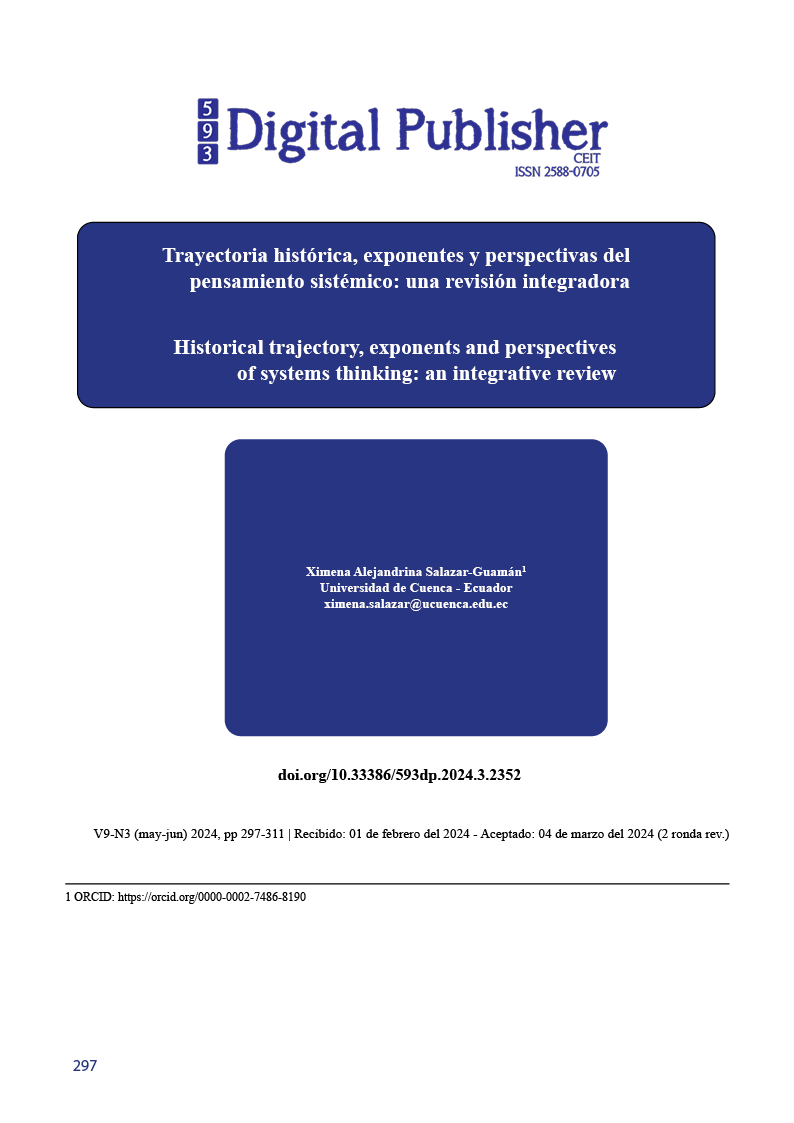Historical trajectory, exponents and perspectives of systems thinking: an integrative review
Main Article Content
Abstract
Given the vast and scattered theoretical production on systems thinking, this article presents an integrative review of its historical-conceptual trajectory. Through an exhaustive analysis of specialized literature, it outlines the transition from the Cartesian mechanistic paradigm towards organicist and holistic approaches to understand adaptive complex systems, identifying its roots in 20th century biology, ecology, cybernetics and quantum physics. It highlights the seminal contributions of von Bertalanffy with his General Systems Theory, Wiener with cybernetics, Ashby with modern cybernetics and Forrester with system dynamics. It also examines subsequent derivations towards complexity, emphasizing interdisciplinary contributions from European exponents such as Prigogine, Morin, Luhmann; North Americans like Simon, Holland, Kauffman; Latin Americans such as Maturana, Varela, García; Asians such as Mesarovic, Takahara; and Africans like Juma. The study enables systematizing connections between fragmented theoretical schools and contemporary trends under a unified framework. The findings provide useful historical and conceptual foundations to guide future research on systems thinking and complexity.
Downloads
Article Details

This work is licensed under a Creative Commons Attribution-NonCommercial-ShareAlike 4.0 International License.
1. Derechos de autor
Las obras que se publican en 593 Digital Publisher CEIT están sujetas a los siguientes términos:
1.1. 593 Digital Publisher CEIT, conserva los derechos patrimoniales (copyright) de las obras publicadas, favorece y permite la reutilización de las mismas bajo la licencia Licencia Creative Commons 4.0 de Reconocimiento-NoComercial-CompartirIgual 4.0, por lo cual se pueden copiar, usar, difundir, transmitir y exponer públicamente, siempre que:
1.1.a. Se cite la autoría y fuente original de su publicación (revista, editorial, URL).
1.1.b. No se usen para fines comerciales u onerosos.
1.1.c. Se mencione la existencia y especificaciones de esta licencia de uso.
References
Cáceres, P. (2008). Análisis cualitativo de contenido: Una alternativa metodológica alcanzable. Psicoperspectivas. Individuo y Sociedad, 2(1), Article 1. https://doi.org/10.5027/psicoperspectivas-Vol2-Issue1-fulltext-3
Capra, F., & Luisi, P. L. (2014). The systems view of life: A unifying vision. Cambridge University Press.
Castellani, B., & Gerrits, L. (2020). Macroscopic, trans-disciplinary introduction to the complexity sciences. https://www.art-sciencefactory.com/MapLegend.html
Cilliers, P. (1998). Complexity and Postmodernism: Understanding Complex Systems. Routledge. https://doi.org/10.4324/9780203012253
Cooksey, R. W. (2001). What Is Complexity Science? A Contextually Grounded Tapestry of Systemic Dynamism, Paradigm Diversity, Theoretical Eclecticism. Emergence, 3(1), 77–103. https://doi.org/10.1207/S15327000EM0301_06
De la Peña Consuegra, G., & Velázquez Ávila, R. M. (2018). Algunas reflexiones sobre la teoría general de sistemas y el enfoque sistémico en las investigaciones científicas. Revista Cubana de Educación Superior, 37(2), 31–44.
Dekker, S. (2016). Drift into Failure: From Hunting Broken Components to Understanding Complex Systems. CRC Press. https://doi.org/10.1201/9781315257396
Drack, M., & Pouvreau, D. (2015). On the history of Ludwig von Bertalanffy’s “General Systemology”, and on its relationship to cybernetics – part III: Convergences and divergences. International Journal of General Systems, 44(5), 523–571. https://doi.org/10.1080/03081079.2014.1000642
Drack, M., & Schwarz, G. (2010). Recent developments in general system theory. Systems Research and Behavioral Science, 27(6), 601–610. https://doi.org/10.1002/sres.1013
Duque Hoyos, R. (2001). Disciplinariedad, interdisciplinariedad, transdisciplinariedad –Vínculos y límites–. Semestre económico, 4(7), 6.
Ellis, G. (2005). Physics, complexity and causality. Nature, 435(7043), Article 7043. https://doi.org/10.1038/435743a
Ellis, G. (2008). On the nature of causation in complex systems. Transactions of the Royal Society of South Africa, 63(1), 69–84. https://doi.org/10.1080/00359190809519211
Ellis, G. (2016). How Can Physics Underlie the Mind? Springer. https://doi.org/10.1007/978-3-662-49809-5
García Cuadrado, A. (1995). Notas sobre la teoría general de sistemas. Revista General de Información y Documentación, 5(1), Article 1.
García, R. (2006). Sistemas complejos: Conceptos, método y fundamentación epistemológica de la investigación interdisciplinaria. Gedisa Mexicana S.A.
Gorelik, G. (1983). Bogdanov’s Tektology: Its Nature, Development and Influence. Studies in Soviet Thought, 26(1), 39–57. https://doi.org/10.1007/BF00832210
Grant, R. M. (2003). Strategic planning in a turbulent environment: Evidence from the oil majors. Strategic Management Journal, 24(6), 491–517. https://doi.org/10.1002/smj.314
Gu, J., & Tang, X. (2005). Meta-synthesis approach to complex system modeling. European Journal of Operational Research, 166(3), 597–614. https://doi.org/10.1016/j.ejor.2004.03.036
Hammond, D. (2002). Exploring the genealogy of systems thinking. Systems Research and Behavioral Science, 19(5), 429–439. https://doi.org/10.1002/sres.499
Hammond, D. (2010). The Science of Synthesis: Exploring the Social Implications of General Systems Theory. University Press of Colorado.
Heylighen, F., Cilliers, P., & Gershenson, C. (2007). Philosophy and complexity. En Complexity, Science and Society (pp. 117–134). CRC Press.
Hieronymi, A. (2013a). The Integration Challenge for the Systems Sciences: Highlighting Internal and External Interconnections. Proceedings of the 56th Annual Meeting of the ISSS - 2012, San Jose, CA, USA. https://journals.isss.org/index.php/proceedings56th/article/view/1823
Hieronymi, A. (2013b). Understanding Systems Science: A Visual and Integrative Approach. Systems Research and Behavioral Science, 30(5), 580–595. https://doi.org/10.1002/sres.2215
Juma, C. (2016). Innovation and Its Enemies: Why People Resist New Technologies. Oxford University Press.
Juma, C., & Mangeni, F. (2018). African Regional Economic Integration: The Emergence, Evolution, and Impact of Institutional Innovation (SSRN Scholarly Paper 3130969). https://doi.org/10.2139/ssrn.3130969
Kijima, K., Iijima, J., Sato, R., Deguchi, H., & Nakano, B. (Eds.). (2022). Systems Research I: Essays in Honor of Yasuhiko Takahara on Systems Theory and Modeling (Vol. 26). Springer Nature. https://doi.org/10.1007/978-981-16-9937-5
Luengo González, E. (2018). Las vertientes de la complejidad: Pensamiento sistémico, ciencias de la complejidad, pensamiento complejo, paradigma ecológico y enfoques holistas. Instituto Teconológico y de Estudios Superiores de Occidente. http://repositorioslatinoamericanos.uchile.cl/handle/2250/2818753
Luhmann, N., Pappe, S., & Erker, B. (1998). Sistemas sociales: Lineamientos para una teoría general (2a. ed). Anthropos.
Maldonado, C. E. (2019). Tres razones de la metamorfosis de las ciencias sociales en el siglo XXI. Cinta de moebio, 64, 114–122. https://doi.org/10.4067/s0717-554x2019000100114
Marwala, T. (2007). Control of Complex Systems Using Bayesian Networks and Genetic Algorithm (arXiv:0705.1214). arXiv. https://doi.org/10.48550/arXiv.0705.1214
Marwala, T. (2010). Finite-element-model Updating Using Computional Intelligence Techniques. Springer. https://doi.org/10.1007/978-1-84996-323-7
Maturana, H., & Varela, F. (2003). El árbol del conocimiento: Las bases biológicas del entendimiento humano (1a ed). Lumen.
Mesarovic, M. D., & Takahara, Y. (1975). General Systems Theory: Mathematical Foundations. Academic Press.
Mesarovic, M. D., & Takahara, Y. (Eds.). (1989). Abstract Systems Theory (Vol. 116). Springer. https://doi.org/10.1007/BFb0042462
Morin, E. (1994). Introducción al pensamiento complejo. Gedisa. https://dialnet.unirioja.es/servlet/libro?codigo=33960
Najmanovich, D. (2008). Mirar Con Nuevos Ojos Nuevos Paradigmas en la Ciencia Y Pensamiento Complejo. Biblos.
Najmanovich, D. (2022). Complejidad de la complejidad vistas desde Abya Yala. Revista Ciencias de la Complejidad, 3(1), Article 1. https://doi.org/10.48168/cc012022-003
Newman, M. E. J. (2011). Complex Systems: A Survey. American Journal of Physics, 79(8), 800–810. https://doi.org/10.1119/1.3590372
Pan, X., Valerdi, R., & Kang, R. (2013). Systems Thinking: A Comparison between Chinese and Western Approaches. Procedia Computer Science, 16, 1027–1035. https://doi.org/10.1016/j.procs.2013.01.108
Paul, S., Twala, B., & Marwala, T. (2012). Organizational adaptation to Complexity: A study of the South African Insurance Market as a Complex Adaptive System through Statistical Risk Analysis. Systems Engineering Procedia, 4, 1–8. https://doi.org/10.1016/j.sepro.2011.11.043
Phelan, S. E. (1999). A Note on the Correspondence Between Complexity and Systems Theory. Systemic Practice and Action Research, 12(3), 237–246. https://doi.org/10.1023/A:1022495500485
Preiser, R. (2019). Identifying general trends and patterns in complex systems research: An overview of theoretical and practical implications. Systems Research and Behavioral Science, 36(5), 706–714. https://doi.org/10.1002/sres.2619
Prigogine, I. (1996). El fin de las certidumbres. Andrés Bello.
Rapoport, A. (1971). Teoría General de los sistemas. El Pensamiento Critico, 47, 76–91.
Richardson, K. A. (2004). Systems theory and complexity: Part 1. Emergence: Complexity and Organization, 6(3), 75–80.
Richardson, K. A., & Midgley, G. (2007). Systems theory and complexity: Part 4 the evolution of systems thinking. Emergence: Complexity and Organization, 9(1–2), 163–179.
Rodríguez Zoya, L. (2012). Sistemas complejos y conocimiento emancipador en América Latina. Notas acerca del rol social y político de un programa de investigación científica de larga duración. Revista Pacarina del Sur. Revista Crítica de Pensamiento Latinoamericano, octubre-diciembre(13).
Schwaninger, M. (2006). System dynamics and the evolution of the systems movement. Systems Research and Behavioral Science: The Official Journal of the International Federation for Systems Research, 23(5), 583–594. https://doi.org/10.1002/sres.800
Souza, M. T. de, Silva, M. D. da, & Carvalho, R. de. (2010). Revisão integrativa: O que é e como fazer. einstein (São Paulo), 8, 102–106. https://doi.org/10.1590/S1679-45082010RW1134
Sysomphanh, K., & Promphakping, B. (2022). Application of systems theory to explore knowledge gaps of standardization: A case of the standard organization of LAO PDR. Kasetsart Journal of Social Sciences, 43(4), Article 4.
Takahara, Y., & Mesarovic, M. (2003). Organization Structure: Cybernetic Systems Foundation. Springer Science & Business Media.
Thomas, J. (1993). La teoría general de sistemas. Cuadernos de Geografía: Revista Colombiana de Geografía, 4(1–2), Article 1–2.
Troncale, L. (1988). The systems sciences: What are they? are they one, or many? European Journal of Operational Research, 37(1), 8–33. https://doi.org/10.1016/0377-2217(88)90277-9
Von Bertalanffy, L. (1972). The History and Status of General Systems Theory. The Academy of Management Journal, 15(4), 407–426. https://doi.org/10.2307/255139
Von Bertalanffy, L. (1976). Teoría general de los sistemas (J. Almela, Trad.; Primera edición en español, Vol. 336). Fondo de Cultura Económica.
Wiener, N. (1948). Cybernetics or Control and Communication in the Animal and the Machine. MIT Press. https://uberty.org/wp-content/uploads/2015/07/Norbert_Wiener_Cybernetics.pdf
Xuesen, Q., Jingyuan, Y., & Ru-wei, D. (1993). A new discipline of science—The study of open complex giant system and its methodology. Journal of Systems Engineering and Electronics. https://www.semanticscholar.org/paper/A-new-discipline-of-science-%E2%80%94-The-study-of-open-and-Xuesen-Jingyuan/67b87512dff1bf0334a67eead178c113e23a29f7


